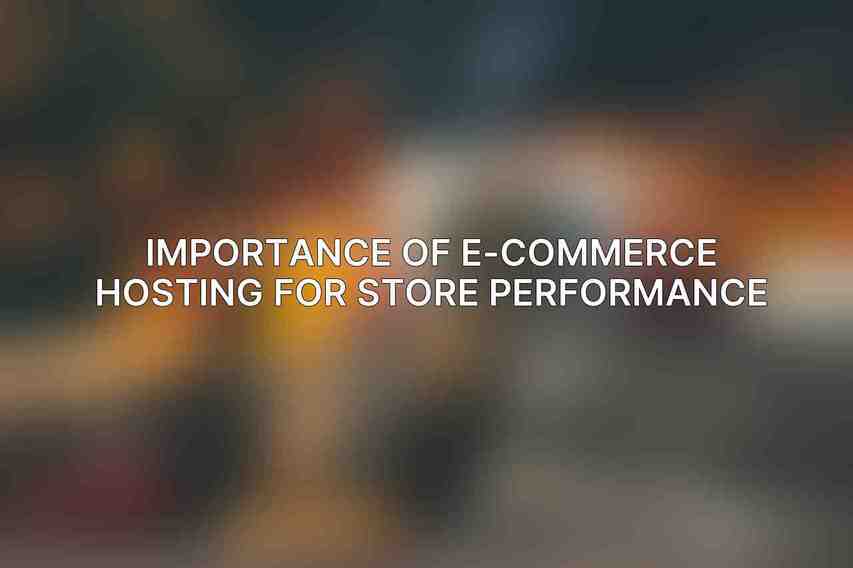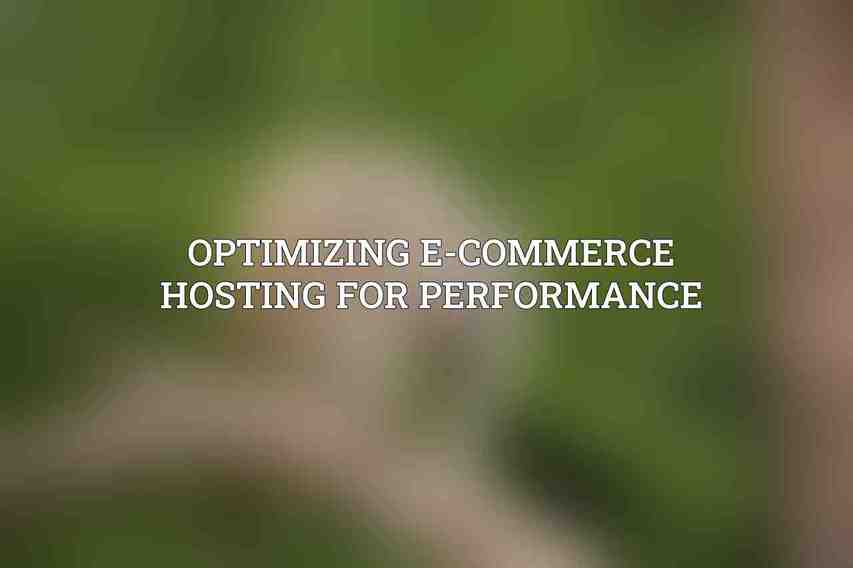E-commerce has become an integral part of the modern business world, with online stores serving as crucial touchpoints for customers. A fundamental aspect that significantly influences the success of an online store is the choice of e-commerce hosting. The hosting provider you select can have a profound impact on your store’s performance, affecting sales and customer satisfaction.
Importance of E-commerce Hosting for Store Performance

customers expect seamless experiences when browsing and making purchases on e-commerce websites. The performance of your online store is heavily dependent on the quality of hosting services you use. A reliable e-commerce hosting provider ensures that your website loads quickly, remains stable during traffic spikes, and offers a secure shopping environment.
Slow or unreliable hosting can lead to a myriad of issues that negatively impact your online store’s performance. From increased bounce rates due to sluggish loading times to potential security vulnerabilities that erode customer trust, the repercussions of inadequate hosting can be substantial. Therefore, investing in the right e-commerce hosting infrastructure is crucial for the success of your online business.
Types of E-commerce Hosting
When it comes to hosting options for your online store, there are several choices available, each with its own set of advantages and limitations.
Shared Hosting
Shared hosting involves multiple websites sharing resources on a single server. While it is cost-effective and easy to set up, shared hosting can lead to performance issues when other websites on the server experience high traffic.
| Shared Hosting | |
|---|---|
| Definition | Multiple websites sharing a server |
| Pros | Cost-effective |
| Cons | Performance impacted by other sites |
VPS (Virtual Private Server) Hosting
VPS hosting provides a dedicated virtual server for your website, offering more control and resources than shared hosting. It strikes a balance between affordability and performance, making it suitable for growing online stores.
| VPS Hosting | |
|---|---|
| Definition | Dedicated virtual server |
| Pros | Greater control and resources |
| Cons | Costlier than shared hosting |
Dedicated Hosting
Dedicated hosting involves a server exclusively for your website, providing maximum performance and customization options. While it is the most expensive option, dedicated hosting is ideal for high-traffic e-commerce sites.
| Dedicated Hosting | |
|---|---|
| Definition | Exclusive server for your website |
| Pros | Maximum performance and control |
| Cons | High cost |
Cloud Hosting
Cloud hosting utilizes virtual servers that draw resources from a network of physical servers. It offers scalability and redundancy, ensuring consistent performance even during traffic surges.
| Cloud Hosting | |
|---|---|
| Definition | Resources from a network of servers |
| Pros | Scalability and reliability |
| Cons | Dependency on network infrastructure |
Choosing the Right E-commerce Hosting Provider
Selecting the appropriate e-commerce hosting provider requires careful consideration of various factors that can impact your online store’s performance.
Key Factors to Consider
- Server Uptime and Reliability: Ensure the hosting provider guarantees high uptime to prevent website downtime.
- Performance and Speed: Opt for a host that prioritizes fast loading times to enhance user experience.
- Scalability and Flexibility: Choose a provider that can accommodate your store’s growth and evolving needs.
- Security Features: Prioritize hosting services that offer robust security measures to protect customer data.
- Technical Support and Managed Services: Look for providers that offer reliable support and managed services to handle technical issues promptly.
Comparison of Top E-commerce Hosting Providers
- Bluehost WooCommerce Hosting
- SiteGround WordPress Hosting
- Shopify E-commerce Platform
- HostGator Gator E-commerce Hosting
- DreamHost WooCommerce Hosting
Optimizing E-commerce Hosting for Performance

To enhance your online store’s performance further, implementing optimization techniques specific to e-commerce hosting can yield significant improvements in speed and user experience.
Server Caching Techniques
- Memcached: In-memory caching system that reduces database load and speeds up dynamic web applications.
- Varnish Cache: HTTP reverse proxy that accelerates content delivery and improves web server performance.
- Redis: Key-value store used for caching frequently accessed data and session storage.
Content Delivery Networks (CDN)
A Content Delivery Network (CDN) is a network of servers distributed geographically to deliver web content efficiently to users. By caching content closer to the user, CDNs reduce latency and improve page load times.
Image Optimization
- Compressing Images: Reduce image file sizes without compromising quality to enhance loading speed.
- Using WebP and SVG Formats: Opt for modern image formats like WebP and SVG for improved performance and responsiveness.
Database Optimization
- Indexing and Query Optimization: Optimize database queries and create indexes for faster data retrieval.
- Using MySQL or MariaDB: Choose a robust database management system to ensure efficient storage and retrieval of e-commerce data.
Security Enhancements
- SSL Certificates: Implement SSL encryption to secure online transactions and build trust with customers.
- Firewall Protection: Deploy firewalls to prevent unauthorized access and protect against cyber threats.
- DDoS Mitigation: Employ measures to mitigate Distributed Denial of Service (DDoS) attacks and ensure continuous availability of your online store.
Monitoring and Troubleshooting Performance Issues
Monitoring the performance of your online store is essential for identifying and addressing potential issues that may affect user experience.
Tools for Monitoring Performance
- Google PageSpeed Insights: Analyze website performance and receive optimization suggestions from Google.
- GTmetrix: Test and monitor page load times and performance metrics.
- WebPageTest: Evaluate website speed and performance from multiple locations worldwide.
Troubleshooting Common Performance Issues
- Slow Page Load Times: Identify factors affecting loading speed and optimize website assets for faster performance.
- High Server Load: Monitor server resources and optimize configurations to handle traffic spikes efficiently.
- Database Errors: Address database issues promptly by optimizing queries, indexes, and database settings.
By implementing these optimization strategies and choosing the right e-commerce hosting provider, you can significantly boost your online store’s performance, providing customers with a seamless shopping experience and driving business growth.
Frequently Asked Questions
What is e-commerce hosting?
E-commerce hosting refers to a type of web hosting service that is specifically designed for online stores. It provides the necessary resources and features to support e-commerce websites, such as secure payment gateways, SSL certificates, and shopping cart functionality.
What are the key factors to consider when choosing e-commerce hosting?
When choosing e-commerce hosting, it is important to consider factors such as website speed, uptime reliability, security features, scalability options, and customer support. These factors can have a significant impact on your online store’s performance and user experience.
How can e-commerce hosting help boost my online store’s performance?
Choosing the right e-commerce hosting can help improve your online store’s performance by ensuring fast page load times, high availability, robust security measures, and seamless shopping cart functionality. This can lead to increased sales, better customer satisfaction, and improved search engine rankings.
What are some popular e-commerce hosting providers to consider?
Some popular e-commerce hosting providers to consider include Shopify, BigCommerce, WooCommerce (for WordPress sites), Magento, and Wix. Each of these providers offers different features, pricing plans, and levels of customization to suit various e-commerce needs.
What are some tips for optimizing my online store’s performance with the right e-commerce hosting?
To optimize your online store’s performance with the right e-commerce hosting, you can consider implementing strategies such as caching, image optimization, content delivery networks (CDNs), and regularly monitoring and optimizing your site’s performance metrics. Additionally, staying informed about industry trends and technologies can help you stay ahead of the competition and continually improve your online store’s performance.

